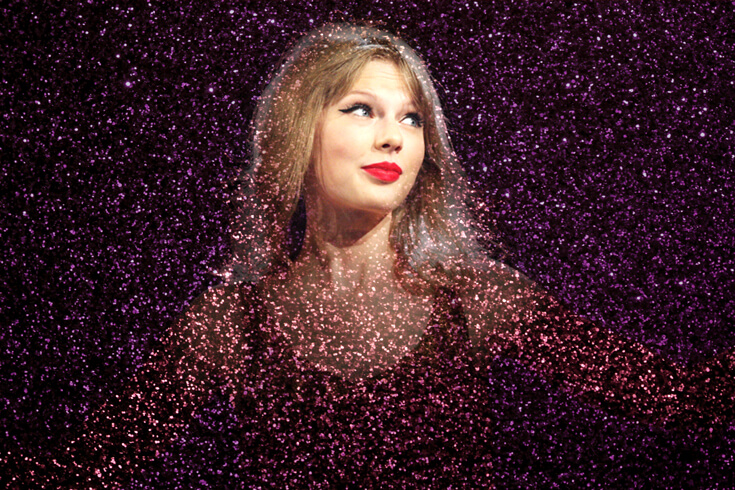Near the end of Miss Americana, the Taylor Swift bio-doc directed by Lana Wilson, in that bring-it-on-home section such movies always seem to conclude with, Swift muses about the demand for constant reinvention that’s placed with special intensity on female pop stars. In an industry ready to discard a woman by the time she’s thirty-five, Swift says, you have to keep “constantly finding new facets of yourself that people find to be shiny.” Various iterations of Swift flick across the screen as she speaks, from teenage ringlet-headed country ingenue to whichever later era had her in a white circus-ringmaster outfit.
Like so much of the movie, it both did and did not work on me. Part of me was moved, roused by Swift’s incisiveness in understanding what the world wanted from her and from female artists more generally. At the same time, another part of me was uninspired, even unsettled, by how little this understanding would change her life—and how familiar her pressure felt.
Perhaps this obsessive self-analysis is a fundamental millennial problem. Too much consciousness-raising, not enough power to do anything about it. Recently, in the London Review of Books, Lauren Oyler wrote of Jia Tolentino (the New Yorker staff writer whose book of essays, Trick Mirror, became a sort of intellectual female millennial rallying cry): “Hysterical critics are self-centred—not because they write about themselves, which writers have always done, but because they can make any observation about the world lead back to their own lives and feelings, though it should be the other way round.”
Oyler’s pan was a rare dissenting voice amid the book’s near-universal praise. I don’t know how fully I agree with her assessment of Tolentino, but I did think of it while watching Miss Americana. The documentary delivers a fairly candid look at Swift’s career, interspersing the singer’s reflections on her last fifteen-plus years of music-industry fame with footage of her writing and recording her 2019 album, Lover. Swift, who is known for her confessional lyrics, resembles Oyler’s hysterical critic in the relentless way she turns her analyses inward. In the film, the pitfalls of the music industry, the pressures of fame, and larger social inequalities are discussed only after being filtered through the prism of Swift’s persona. What emerges is a sense of Swift—born in 1989, a fact she made a meal of in her 2014 album of the same name—as the prototypical millennial star: one who is eminently aware of the pressures under which her life is constructed but unable to escape them. Swift’s work is the project of millennial life writ large—the need to, as Tolentino puts it in one of Trick Mirror’s essays, “always be optimizing.”
Last September, I saw Tolentino speak at an event in Toronto. During the interview, she noted the absence of “solutions” in her book (another aspect of her work that Oyler takes issue with). Her essays end, Tolentino said, the way that thinking about these things—feminism, capitalism, politics, economics, our own precariousness—often ends, especially in our typical ways of discussing them, like with friends at a bar: “Yeah, I don’t know, man.”
If there’s one thing our generation has been taught, it’s the importance of transforming yourself into a marketable brand and then proceeding to market that brand for every waking moment until you die.
After spending an hour and a half with Miss Americana, I had the same feeling. The hypercompetent Swift had morphed into an embodiment of this discursive millennial anxiety. From the beginning of the film, she professes feeling a deep-seated pressure to always perform—a self-described need to be a “good girl,” to “be thought of as good.” She describes being “trained to be happy when you get a lot of praise.” This palpable sense of artifice has always rankled me about Swift: the sense of heavy PR calculation, the messy breakups rendered as neatly packaged pop, the edges sanded off, the candid, beach-romping Instagram shots revealed to be the product of a hired photographer.
It’s almost a cliché at this point to say that celebrities are creations, with carefully crafted looks and personas backed by sizable corporate interests. At the same time, we seem to demand that celebrities not be “fake.” Swift in particular embodies this contradiction, perhaps because she seems to present as so guileless. As her notorious awards-show “surprised” face suggests, she is neither sincere enough nor good enough at hiding her insincerity. If this all sounds sexist and nitpicky, that’s because it is. But, if there’s one thing our generation has been taught, it’s the importance of transforming yourself into a marketable brand and then proceeding to market that brand for every waking moment until you die.
“I have a really slappable face,” Swift says blandly at one point in Miss Americana, watching herself in playback on a music video shoot. Next to her, the director doesn’t seem to know how to respond.
Watching Swift is watching the self-consciousness of our age played out on an intensely public scale. She always looks like she’s doing math calculations in her head, meticulously trying to ensure that she’s delivering perfection at all times. When she made that comment about her face, I thought of the last time I tried to take a selfie: twenty minutes spent agonizing over my front-facing camera before rage-quitting Instagram.
Oddly, what turns out to be the most “authentic” and “relatable” aspect of Swift is the care she puts into her own construction. The documentary puts on display a central pressure of millennial life: to create from yourself a coherent product that can be packaged and reliably sold. For those of us who came of age in this competitive, unstable era, the need to be liked is actually an economic one, from keeping our LinkedIn and Twitter profiles attractive for potential hiring managers to participating in gig-economy labour, where your earning potential might be cut off by a bad review. If anyone would be exempt from the cons of millennial life, you’d think it would be a star with an estimated net worth of $400 million.
The pop idols of my nineties childhood seemed like wild children penned into an industry “image” by domineering management—Britney cast as immaculateness personified in a red latex jumpsuit, the Spice Girls slotted into a manufactured friendship (#squadgoals) and assigned single-trait personalities.
Stars today are more accessible than ever before. They can speak directly to their fans with a single tweet. As teen-mag interviews and professional photoshoots have given way to Instagram captions and candid selfies, it’s tempting to understand celebrities as in control, to an unprecedented degree, of crafting and presenting their personas. Yet the marketing machine has clearly not stopped running. In fact, it’s often tied to a star’s ability to rally and engage large “armies” of cutely named fans (in Swift’s case: Swifties) on the basis of their charismatic online presences.
Yet somehow the marketing and image machine has moved from an external to an internal locus. How will you ever get out from under your domineering manager’s thumb if you are in fact your own domineering manager?
In his 2017 book, Kids These Days: Human Capital and the Making of Millennials, Malcolm Harris documents the multitude of ways that capitalism has shaped the millennial identity, its late-stage push for profit maximization turning young people into “human capital” while the pay-to-labour gap steadily increased. To achieve excellence in all fields, from sport to science, parents push their children into specialized labour younger and younger in order to maximize their chances in an intensely competitive, increasingly precarious job market. The participation trophies so freely handed out to us as kids, supposedly emblematic of our generation’s weak belly, are revealed by Harris to be more akin to Pavlovian training—we were actually being socialized to become as “employable” as possible.
We see the pressure of this hypercompetition when Swift gets a call alerting her that she has not been nominated for any Grammys that year. As she receives the news, only the briefest flicker of anguish passes over her face. “It’s okay,” she says, cutting off the voice on the other end of the line. “I just need to make a better record . . . I’m making a better record.” The instant flick to “I need to make a better record” has the kind of Big Capitalist Energy that we millennials were taught would serve us well in our future careers, and no doubt it will net Swift some additional future accolades. But it also betrays a certain tunnel vision, an inability to engage with the world outside oneself.
Cannibalizing her inner world has always been at the centre of Swift’s appeal. She’s famous for the way she interacts with her fans, inviting them to exclusive album-listening parties, donating to their GoFundMe campaigns, nodding to their internet-y inside jokes (see: the “no its becky” T-shirt), and loading her albums with hints and Easter eggs that become the subjects of her fans’ obsessive decoding. Her lyrics order the raw material of her own life into consumable stories, often reflecting and commenting on her own public perception. In a sequence early in the film, Swift is digging through old journals. A notebook from age thirteen is emblazoned with a haunting recitation: “My life, my career, my dream, my reality.” For a teen, she seems to have placed the word “career” surprisingly high on her list of priorities.
Later in the documentary, Swift makes an attempt to engage with the outer world through her supposed political awakening, a journey that’s spurred on by a sexual assault trial (incited when a DJ grabbed her ass and then, after Swift’s team reported him and he lost his job, tried to sue her over it). Before Swift got political, she had been intensely criticized for her conspicuous silence—a criticism she tries to address. She voices her regret about choosing to stay out of the fray during the 2016 election and argues with her team over whether to share her politics now.
When Swift finally breaks her silence and endorses two candidates for the Tennessee midterm, the so-called Swift Lift is not enough to keep out of office the Republican candidate who drove her to speak out in the first place. In response, Swift pledges to keep fighting, keep resisting. In a moment heavy with significance, she returns to the MTV Video Music Awards, the site of her famous upstaging by Kanye West, except this time, she’s surrounded by a posse of friends from the LGBTQ community, advocating from the stage for her petition in support of the Equality Act.
Back in the studio, she imagines the masses of young people who got their hopes up before seeing their political dreams dashed. Imagine being a young person who campaigned for Beto O’Rourke, she tells her producer, or who knocked on doors for Stacey Abrams. Imagine how crushed you’d feel. She begins to write a song of hope, the first verse of which oddly transforms these imagined characters into first-person interactions: “It keeps me awake / The look on your face / The moment you heard the news.” The intended anthem is meant to inspire, though the lyrics are almost too general to mean anything; the chorus is just the repetition of a vague phrase, “Only the young can run,” a blithe statement of unwitting ageism. In possibly the best scene of the movie, Swift makes her pitch to get political to two unidentified, identical-looking older white men and her father, who suggests that she should follow the example of “other celebrities” like Bing Crosby and Bob Hope and just stay out of it.
Before this movie, I assumed that Swift’s political reticence was an attempt to hide the fact that she was a Republican. But her silence, in a way, comes honestly—she was raised in the country music scene, a place where that is just not done. The Dixie Chicks are brought up as an example despite the fact that things have changed since they criticized Bush in 2003 and, by 2016, many celebrities were speaking out against politicians. The movie refuses to acknowledge that, by now, political awareness is generally a savvy PR move. Swift’s choice, real though it is, is painted wholly as a sacrifice; in reality, as the relative lack of backlash proved, it was rather a good call for her brand.
This example, though, proves again the state of millennial affairs. To be barred from making her music (or rather, from her music being popular) would be the ultimate loss. Taylor Swift was programmed to do this.
The biggest trick of millennial life is that our labour has become so entwined with our personalities that we cannot divorce ourselves from it. Hustle or die. “Find a job you love and you’ll never work a day in your life,” we were told from birth, the implication being that you should never stop working, even for a single day.
The film does cover a point in Swift’s life where she steps away from the public eye. She begins dating a “mystery man” (well known to be the actor Joe Alwyn), who is present only as a disembodied hand holding hers, and takes some time to recover after a shattering moment of online vitriol: the Kanye thing blows up in her face, #TaylorSwiftIsOverParty is trending on Twitter, and she can watch millions of people defame her and insult her in real time.
The time away is presented as a period of resetting and self-discovery. Home video–like B roll shows Swift and the disembodied hand going on road trips and gallivanting around fields. But, at the same time, this footage is interlaced with a video of Swift playing an acoustic version of a new song, shakily shot by a phone camera. Halfway through this montage, I realized: Hey, she’s not taking time away! She’s working on her next record!
It’s hard not to want more from Swift, no matter how much she gives you. It’s hard because she’s smart but not too smart and funny but not too funny, and she overshares but doesn’t actually tell you anything. It’s the kind of tantalizing personality that I suppose serves a pop star well. But her moments of clear-eyed self-reflection left me wishing she would blow something all the way up.
Near the end, she spirals into the kind of pop-feminist rant all women my age tend to find ourselves in, the kind where you ramp up a litany of grievances and then end by apologizing, then commiserate with your friend over why you just apologized, starting the cycle all over again. “Yeah, I don’t know, man.” Watching it, I felt myself deflating. The video clips that played under Swift’s comments about reinvention began to feel like a hall of mirrors that she’ll never escape. Once you’ve shined up all your facets, then what? You’re just a shiny gem hidden in a drawer.





